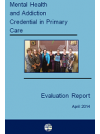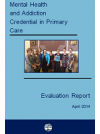This report is an evaluation of a demonstration coordinated by Health Workforce New Zealand. The credential aims to recognise and boost the skills and knowledge of registered nurses who work with patients with mental health and addiction needs.
Purpose
The overall purpose and intent of the Primary Care MH&A Credentialing Project is to contribute to improving the population’s health in the area of MH&A. Within this overall purpose and intent, the goal of the project is to enhance the MH&A intervention capacity and capability of primary care nurses within their registered nurse scope of practice.
Key Results
The project outcomes/impacts and the personal accounts from three of the nine credentialed nurses as well as an increasing interest in credentialing from primary care and other sector organisations support the potential benefits for wider implementation of the MH&A Credentialing Framework, for the practice enhancement of primary care nurses, for improved MH&A service provision and, most importantly, to contribute to high quality care for people affected by MH&A issues. The primary recommendation for wider implementation of the MH&A Primary Care Nursing Credentialing Framework is supported by two secondary recommendations. These are maximising the MH&A potential of the primary care nursing workforce and the development of a primary care MH&A workforce development plan.
- Wider implementation of the MH&A Credentialing Framework
- The College recommends wider implementation of the credentialing framework by the Ministry of Health in partnership with Health Workforce New Zealand (HWNZ) and the College.
- Wider implementation of the MH&A Credentialing Framework is in accordance with the four areas of focus in the MH&A Service Development Plan (MOH, 2012). For wider implementation support will be required from key stakeholders that include the National Nursing Organisations Group, Directors of Mental Health Nursing, DHBs and primary care organisations, non-government organisations, Corrections, and consumers.
- It is also recommended that in conjunction with wider implementation an external evaluation of the impact of Primary Care Nursing MH&A Credentialing is conducted. Such an evaluation would include examining the impact of credentialing on primary care nurses’ practice, on service provision and integration of care and on patient outcomes and the experience of care. It is envisaged that this evaluation would require funding support and would be conducted by a university department.
- Maximising the MH&A potential of primary care nurses
- It is recommended that strengthening a MH&A stepped-care approach will provide opportunities to maximise the potential of the existing primary care nursing workforce and support the need for primary care nurses to access MH&A education and training and practice development support.
- Maximising the potential of the role of primary care nurses would be demonstrated by primary care nurses undertaking screening and providing early intervention and referral as well as contributing to the provision of continuing care for people with complex issues and/or long-term conditions.
- Primary care nursing mental health and addiction workforce development
- It is recommended that HWNZ and the College partner to provide leadership for the development of a primary care nursing MH&A workforce development plan that includes the establishment of linkages between all key stakeholders.
- This recommendation is in accordance with Priority 8 of the MH&A Service Development Plan (MOH, 2012): Supporting and strengthening our workforce.


